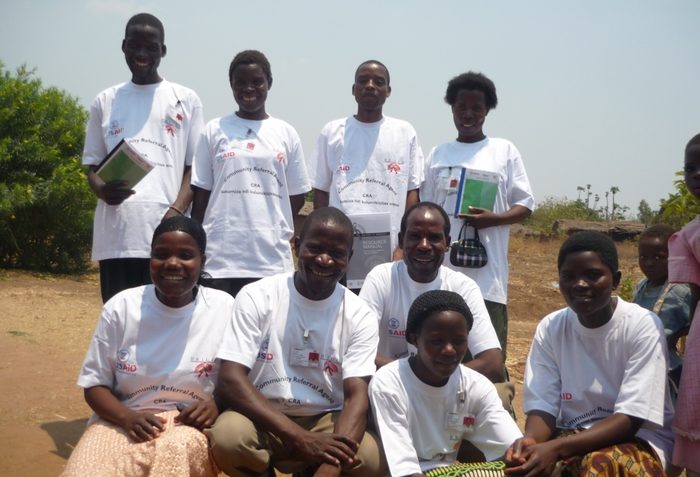Community health volunteers: a vital link in Malawi
 © Frontline AIDS
© Frontline AIDS
Community volunteers are changing things for local people affected by HIV and more people are going for counseling and family planning.
AIDS is the leading cause of death among adults in Malawi. We support a pioneering programme where volunteers work in the community and refer people to formal health services and Community-Based Organisations (CBOs) for support.
The programme also promotes behaviour change using mass media approaches, in particular radio, and other community-level activities to prevent HIV. It is part of a five-year USAID-funded programme known as BRIDGE II and five local partners are involved as well as Save The Children, Pact Malawi and the Alliance.
Volunteers in the community
The Alliance trained 520 volunteers in four districts – Chiradzulu, Thyolo, Mulanje and Phalombe – in the southern region of the country where, according to UNAIDS, HIV prevalence remains highest at 14.5%.
Volunteers, or community referral agents (CRAs) offer a one-to-one service, and this has paid huge dividends with more than 40,000 people acting on a referral in 2012. Forty-two % went for HIV counselling and testing, 25% for family planning and 12% sought condoms. There was a 94% success rate for referrals for prevention of mother-to-child transmission (PMTCT) with more than 1,800 women taking up this service.
It is not just individuals who have benefited. About 2,500 couples were referred for testing and family planning services, antiretroviral therapy adherence, and the prevention and treatment of sexually transmitted infections. Self-help groups for people living with HIV are another important component of the programme, illustrating the importance of linking formal health services to informal services based in the community.
In March 2013, Malawi’s President, Joyce Banda, commended BRIDGE II for its work promoting Option B+, where all pregnant women living with HIV are offered life-long ART, regardless of their CD4 count. The referrals programme supports the important work to raise community awareness about PMTCT.
Unique referral model
The Alliance /BRIDGE II referral model is unique because it places volunteers in the community and not just at the health centre, which broadens their reach. (Other models often focus on people who have already sought healthcare.) Making sure the volunteers are known and trusted by the community is essential to the model’s success.
The BRIDGE II partners will continue to strengthen the capacity of CBO networks by providing further training in supervision, leadership, and group dynamics. 2013 was the last year of the programme but the Alliance will focus on working with other NGOs to advocate for a package of services to influence the Ministry of Health’s approach on referrals.
BRIDGE II is implemented by the Johns Hopkins Bloomberg School of Public Health Centre for Communication Programs (JHU.CCP) in partnership with Save the Children International, PACT Malawi, International HIV/AIDS Alliance and local partners.
Read more about BRIDGE II.
This article was written as the International HIV/AIDS Alliance, before we changed our name to Frontline AIDS.
Tags
MalawiSexual and reproductive health and rights (SRHR)


